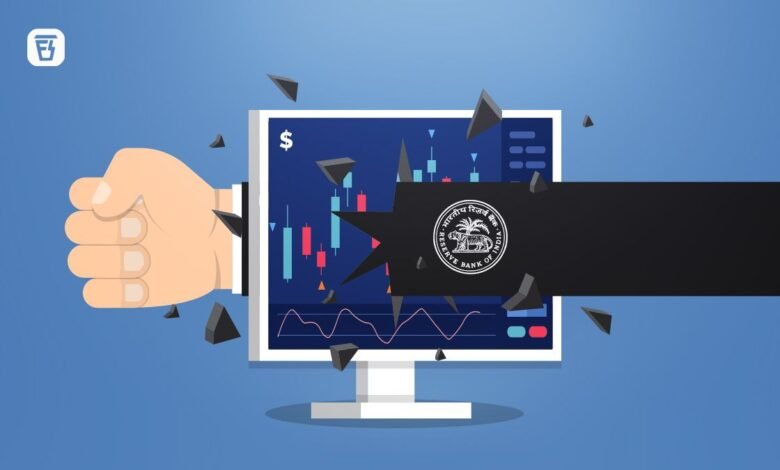RBI’s crackdown on currency trading?

In today’s Finshots, we explain the Reserve Bank of India’s (RBI) latest directive on trading currency derivatives on the exchanges.
Also, a quick side note. If you’re someone who has great communication skills and are looking to join a dynamic team, Ditto is recruiting new Insurance Advisors. You don’t even have to know much about Insurance — We will train you from scratch and you can enjoy working remotely with a great team. Click here to apply.
The Story
The RBI just killed India’s $5 billion-a-day currency derivatives market!!!
Wait…what?
Okay, killed might be a bit of an exaggeration but hear us out. And let’s start with some context on what currency derivatives are.
Let’s say you’re a US-based businessperson with interests in India. You deal with the Rupee and repatriate your earnings back to your home base. But you fear that the currency will drop in value. You worry that you’ll have to convert more rupees to get 1 dollar in the future. And you want to hedge that risk.
So you find a counterparty. You say, “The current rate is 83 rupees to the dollar. At the end of the month, if the spot or daily market reveals that it has fallen to 85 rupees, it won’t matter. I’ll pay you only ₹83. And you give me the $1.”
You’ve just shaken hands on a “forward” contract that you have customised to meet your requirements. But this is just a handshake. It isn’t a regulated contract.
For that you have the futures market.
Now this is pretty much the same as a ‘forward’ contract we just spoke about. The difference is that this is traded on the exchange in India. That means they aren’t custom contracts. They’re standardized deals. So they operate on some predetermined parameters — such as which currency pairs (INR/USD, INR/EUR) can be traded; the minimum value of a trade; in what multiples of value a trade can be placed; even the payment of margin that’s to be deposited upfront to reduce risk.
And these contracts are called currency derivatives.
Now the thing is, most of the volume in the futures market is driven by people who simply want to take bets and speculate — 70% of it. These folks don’t have a foreign currency liability they’re trying to hedge. They’re not importers or exporters that need the US dollar or the Euro to run their business. Rather, they’re just trying to dabble in these currency derivatives as a way to make some extra money.
And right now, the RBI doesn’t seem to be a big fan of these speculators.
From today (5th April), the banking regulator wants people to sign a declaration that they have real exposure to the currency. To confirm that trade is linked to a genuine transaction in foreign currency and that it’s not a speculative trade.
And that’s a body blow to over 70% of the activity in the currency derivative market.
But why on earth is the RBI introducing this harsh measure, you ask?
So no one knows for sure why the RBI suddenly woke up this year. But some theories are floating around. And one of them has to do with managing the volatility or the ups and downs of the rupee.
See, the Indian rupee isn’t completely free. The RBI keeps it on a loose leash. For instance, if it sees the currency losing value too quickly, it will jump in and try to arrest the fall. It will buy rupees and sell dollars using its forex reserves. So there’s some bit of currency management that happens.
Now the problem that the RBI often faces is that if people think that the rupee is heading down, they’ll begin speculating. They’ll use the currency derivatives market and bet that the rupee will fall from 83 to 85. Now if more people place similar bets, it becomes a self-fulfilling prophecy. Everyone starts to believe it’s true. And that might feed into prices in reality. The rupee could fall further because of these speculators.
And that will put more pressure on the RBI to support the rupee.
Or it can happen in reverse too. If there is a lot of foreign interest in the country, then it could lead to demand for the rupee. Naturally, that would mean our currency gets stronger. And theoretically, a strong rupee could hurt our exports and trade.
Again, the RBI will need to step in and manage the rupee then.
So there’s a theory that the RBI might be trying to keep the rupee more in control from now. But we don’t know if that’s the case for sure.
But the big question is — How will this impact the market?
Well, we don’t know quite yet. Some analysts believe it will kill the market. Because there are no speculators and only hedgers, the number of people in the market will drop. And fewer participants mean that price discovery for currency futures and options will be hurt too.
Maybe that will hurt small companies that genuinely need to hedge their rupee-dollar or rupee-euro exposure as well.
And others are worried that such arbitrary rules don’t do the regulator and the country any favours. That people might consider us a “nanny” state with too much interference.
That’s not a good look, is it?
Until then…
Don’t forget to share this story on WhatsApp, LinkedIn, and X.
📢Finshots is also on WhatsApp Channels. Click here to follow us and get your daily financial fix in just 3 minutes.
Why you MUST buy a term plan in your 20s 👇🏽

The biggest mistake you could make in your 20s is not buying term insurance early. Here’s why:
1) Low premiums, forever
The same 1Cr term insurance cover will cost you far less at 25 years than at 35 years. And once these premiums are locked in, they remain the same throughout the term!
So if you’re planning on building a robust financial plan, consider buying term insurance as early as you can.
2) You might not realize that you still have dependents in your 20s
Maybe your parents are about to retire in the next few years and funding your studies didn’t allow them to grow their investments— making you their sole bread earner once they age.
And although no amount of money can replace you, it sure can give that added financial support in your absence.
3) Tax saver benefit
Section 80C of the Income Tax Act helps you cut down your taxable income by the premiums paid. And what’s better than saving taxes from early on in your career?
So maybe, it’s time for you to buy yourself a term plan. And if you need any help on that front, just talk to our IRDAI-certified advisors at Ditto.
With Ditto, you get access to:
- Spam-free advice guarantee
- 100% free consultation from the industry’s top insurance experts
- 24/7 assistance when filing a claim from our support team
Speak to Ditto’s advisors now, by clicking the link here.




